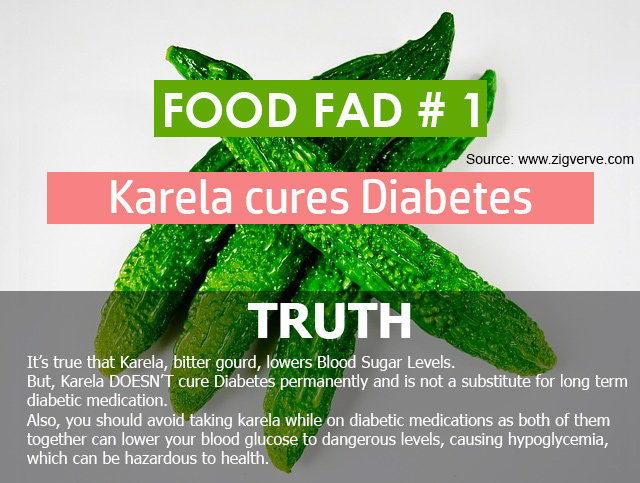With the scientific name Momordica charantia, bitter gourd is also known as Bitter squash, Bitter Melon, or balsam-pear in English. In India it’s called Karela (Sanskrit name), while it’s called Goya in Okinawan.
Karela grows as a tropical and subtropical vine belonging to the family Cucubitaceae. It’s chiefly grown in Africa, Asia, and Carribean. Karela fruit is the edible part that is extremely bitter in taste.
Karela or bitter melon originated in the Indian Subcontinent and spread to China in the 14th century.
It comes in various shapes, size varying in their bitterness.
Karela’s Use in Cooking
The fruit of bitter gourd is consumed while it is green or in its early yellowing stage. Sometimes leaves and young shoots of bitter gourd are also consumed.
In Chinese cuisines bitter gourd is used for its bitter flavor and added in stir-fried, frequently with douche and pork, dim sum, herbal teas and soups. Bitter melon is also used instead of hops in many Okinawan and Chinese beers as bittering agent.
Karela is widely popular in India. In North India Karela is cooked as sabzi or stuffed with spices (masala karela bharta) and fried in oil. It’s often served with yoghurt to compensate for bitterness.
In South India various dishes are prepared with Karela, like thuvaran or thoran prepared with grated coconut, theeyal prepared with roasted coconut, mezhukkupuratti which is stir fried in spices, and pachadi, a diabetic medicinal food.
Karela is also used as achar (pickles).

Health Benefits of Karela
- Bitter melon or Karela is very low on calories with only 17 Kcal/100g, thus it makes for a good low calorie diet for weight conscious people.
- It is a rich source of nutrients like vitamins, minerals, dietary fibers and antioxidants.
- Bitter gourd is most famous for its benefit in diabetes. It contains a compound called Polypeptide-P, which has a similar action to insulin and, thus, lower blood sugar levels. Besides, it also contains charantin which is also hypoglycemic. It promotes glucose uptake and glycogen synthesis in the liver cells, adipose tissues and muscles.
- Karela pods are rich source of folic acid with about 72 µg of folates per 100g. Folic acid is a very important vitamin especially in growing children and pregnant women. Folic acid deficiency during pregnancy can result in congenital defects like neural tube defects in newborn babies. However, due to other reasons karela shouldn’t be used during pregnancy. (read the Side-effects)
- Bitter melon is also a rich source of Vitamin C, with about 84 mg per 100g. Vitamin C acts as a potent natural antioxidant and helps in getting rid of free radicals from our body.
- Moreover, bitter melon is an excellent source of several flavonoids too, like α-Carotene, ß-carotene, zea-xanthin and lutein. Karela also contains fair quantities of Vitamin A. Together these compounds aids in scavenging free radicals, thus protecting against cancers, ageing, and many diseases.
- The rich fiber content in bitter melon aids in digestion and bowel movements. This helps in relieving constipation and indigestion problems.
- Karela is also contains B-complex vitamins like Vitamin B3 (niacin), Vitamin B5 (Pantothenic acid), Vitamin B6 (pyridoxine), along with minerals like zinc, iron, magnesium and manganese.
- Some studies have also shown that Bitter gourd contains few phytochemical compounds which may be effective in treating HIV/AIDS.
- Studies have also shown that bitter gourd may have some effect in various cancers too.
Ultimate Guide about #BitterGourd (#Karela) – #HealthBenefits & #SideEffects via @zigverve http://t.co/DzFN1AHp0w
— Zigverve.com (@zigverve) September 12, 2015
Side-effects and Contraindications
Various reported side-effects of bitter melon or karela are:
- Diarrhea
- Fever
- Abdominal pain
- Hypoglycemia
- Chest Pain
- Urinary incontinence
Symptoms are usually mild, without requiring any treatment. Rest when facing a side-effect after using karela.
Use of bitter gourd is contraindicated during pregnancy because it can accentuate contractions, bleeding and abortion.
Diabetics on medication should also avoid Karela or bitter gourd because it may induce hypoglycemia due to the combined action of anti-diabetic drugs and compounds in bitter melon.
Refrences:
http://www.diabetes.co.uk/natural-therapies/bitter-melon.html
http://bittermelon.org/heal/bittermelonandaids
http://ndb.nal.usda.gov/ndb/foods/show/2869
http://www.ncbi.nlm.nih.gov/pubmed/12678140
http://www.ncbi.nlm.nih.gov/pubmed/20198408
